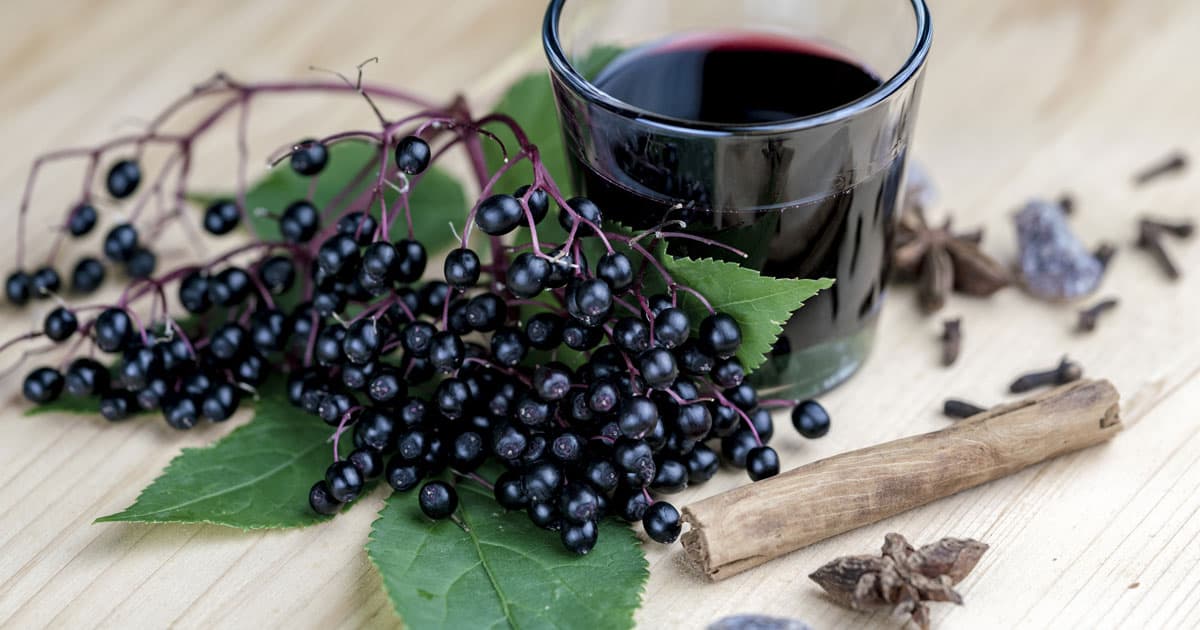
For most Americans, the only reference they have for elderberries is a taunt in a Monty Python film. This could be set to change, as the health benefits of elderberries are helping to make the berries of the Sambucus nigra tree more and more popular. Prized through the centuries by traditional folk medicine practitioners and air travelers alike, the extract derived from black elderberries can be a potent and nutritious addition to your diet.
Possessing antiviral properties, elderberry juice is also known to be a diuretic and to help with a host of health conditions from heart disease to constipation. Despite their value in helping to treat the effects of hay fever, and high levels of dietary fiber, eating raw elderberry fruit is not recommended. Toxins in some parts of the plant can cause nausea and vomiting.
Known to Native Americans and European settlers alike, the black elderberry is native to the eastern seaboard of North America and in Europe. Elderberry supplementation has been common for centuries before science was telling us we needed more antioxidants in our diet.
It is antioxidants in the form of flavonoids called anthocyanins that give elderberry juice the long list of benefits people seek. This is the same compound found in many other dark colored fruits like raspberries. Offering up powerful anti-inflammatory properties to prevent the oxidative stress of free radicals can improve your heart health, lower your blood pressure and cholesterol, and even improve blood sugar levels.
Due to the presence of toxic chemicals in the stems, seeds, and other parts of the plant, elderberries are not eaten raw. Getting around this inconvenience is often handled by producing an elderberry syrup by cooking and reducing the juice of the raw berries. Sometimes elderberry extract can also be found in gummies, lozenges, or syrups. This can be a great way to get the benefits of antioxidant-rich fruit without the sugars and carbohydrates found in most whole fruits.
It has long been believed that elderberry supplementation reduces cold duration, though more research is needed to ensure this is not a placebo effect. There is some evidence that elderberry juice can help in reducing flu symptoms, as has been believed in folk medicine for centuries, but the actual effects of elderberries on the common cold still need to be studied. Despite this, the long history of elderberry nutrition means the extract of this dark fruit is gaining popularity as a natural flavor that can improve the health credentials of any food or beverage to which it is added.
High in several vitamins and minerals, elderberries share many of the health benefits found in common fruits such as blueberries, black currant, or blackberries. A few of the most prominent nutrients found in elderberries include:
Due to the high levels of anthocyanins and other antioxidants found in these dark berries, many people take elderberry extract as a dietary supplement. Whether you should take it daily is a question of how it is prepared. Homemade extracts from the elderberry plant may contain small amounts of cyanide, so caution should be used to make sure you are not ingesting poisons.
No matter who you are, you should exercise caution when you add new foods to your diet. This is particularly true for people who may be subject to having foods they eat interact with drugs they are taking. Individuals who have conditions affecting their immune system should exercise caution or avoid taking elderberries altogether.
Poisoning from the seeds, leaves, or bark of the elderberry tree can cause vomiting, nausea, and diarrhea. For this reason, individuals who are susceptible to the effects of diarrhea and dehydration should take care in consuming elderberries prepared at home. Commercially prepared and processed elderberries are not generally a source of danger, though.
Elderberries are a perfect example of why it matters where your ingredients come from. At FruitSmart, we understand the need to carefully prepare every ingredient to ensure no toxins or contaminants are found in our final products. For some ingredients this may not matter as much, but with fruits like the elderberry or pineapple where some portions of the whole fruit are unhealthy for humans, proper preparation is essential.
The potential side effects of elderberries are no reason to shy away from their powerful health benefits. This is especially true in juices, kombuchas, seltzers, and other beverage products where extracts are natural candidates to add natural flavors, color, and nutrition that people are increasingly on the lookout for in the products they buy.
As consumers get more and more conscious of the ingredients in the products they buy, and as beverage sectors such as seltzers and ciders widen to invite more and more experimentation, flavors such as elderberries can help you bring more distinctive, attractive combinations to your product lines.
If you are interested in learning more about how partnering with FruitSmart can help you expand your offerings and strengthen the health credentials of your products, contact us today to learn more.
